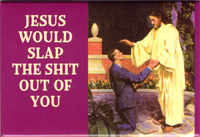A humanist with spirit
This week, writer John Scalzi is blogging his answers to questions submitted by readers of his blog. Yesterday’s question was, in essence: What is the meaning of life?
Mr. Scalzi suggests that he devised his answer to this question via humanist (non-religious) means:
What I’m leaving out here, for the space of relative brevity, is a detailed examination of processes by which I came to this intellectual methodology, generated through years of self-examination and self-realization via intentional and unintentional experiential phenomena, to produce the robust heuristic structure through which I filter data.
Here’s the heart of his reply:
Finally, in the larger sense — the one in which I am a citizen of the world, that I like no man am an island, blah blah blah blah blah, it becomes a matter of asking one’s self first whether one wants to be engaged in the world, and then if so, how best to be of utility. I do enough things that I feel engaged in my world and I feel like I’m trying to do beneficial things (or at least I’m doing as little harm as possible). I think it’s my responsibility to try to make the world a better place than it was before I got here; I don’t feel obliged to be heart-rent at every thing that’s wrong with the planet. One person can make a difference in the world, so long as that one person realizes that one person can not do every thing or be actively concerned with every damn thing. I pick and choose; everyone does. I focus on what I think I do well, and where I think I can do good. (emphasis added)
I find his answer to the BIG QUESTION quite similar to my own, which I formed in the context of being a Christian. I guess it all comes down to the source of the responsibility, and his answer shows what I believe: that there are many ways to realize your obligation to ‘love your neighbor’.

 This fridge magnet, and several other equally awesome ones, apparently adorn Rick Diamond’s refrigerator (photos taken by Gordon Atkinson). Seeing the magnets and visiting
This fridge magnet, and several other equally awesome ones, apparently adorn Rick Diamond’s refrigerator (photos taken by Gordon Atkinson). Seeing the magnets and visiting 